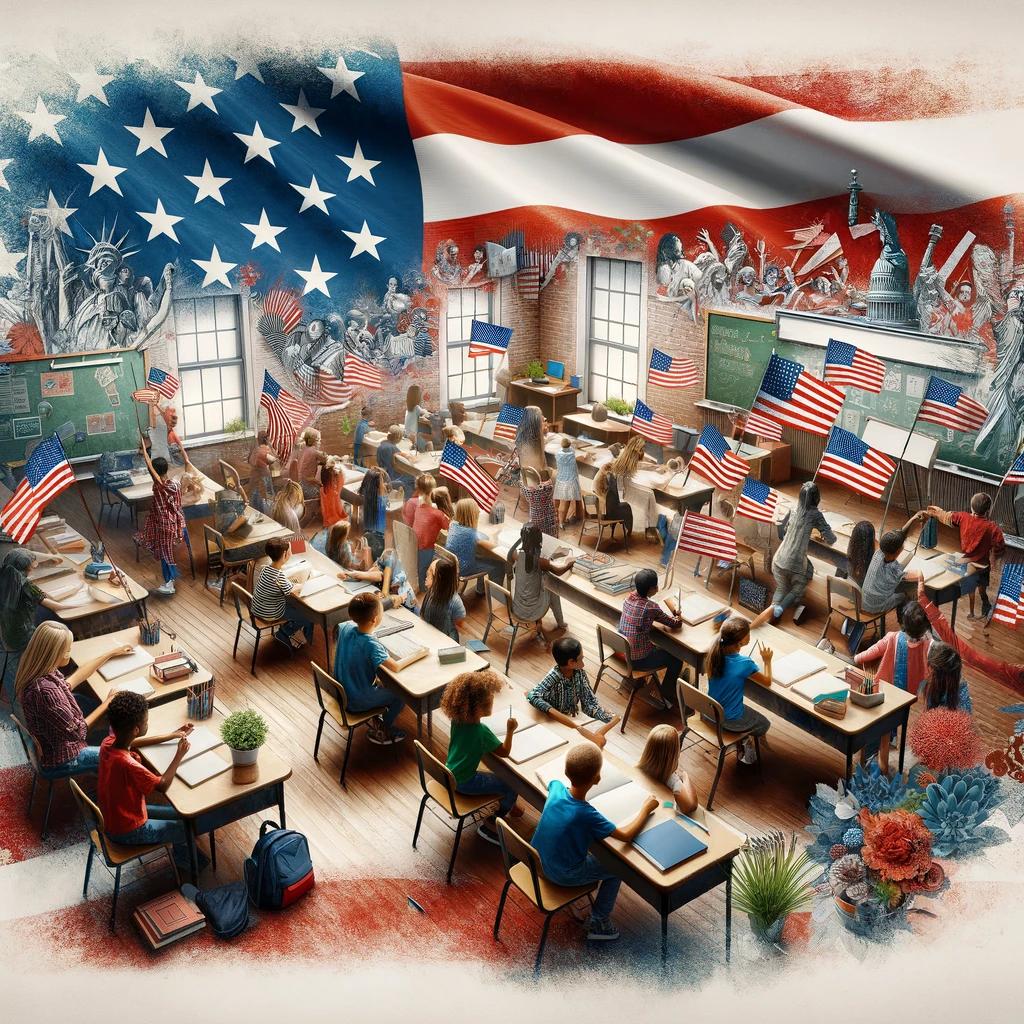Written in response to the opposition of bills ESB 5462 and ESHB 2331 by Micah Valentine, Vice President of the Kennewick School Board. This article represents the opinions of one single member and not the board as a whole.
I often say, “We get more of what we focus on,” or “what we focus on expands.” I believe this principle to be a fact of life. In a school setting, if we concentrate on teaching and discussing a particular topic, it becomes a bigger part of our lives. In our schools, that focus should be on something that edifies us, helps us grow and contribute to the world, and something which unites us all: our pride in being Americans.
In education, where we shape our children’s futures, we must focus on the purpose of school and not venture into the realm of personal ideologies. We must keep our classrooms free from political agendas. I believe that the more we concentrate on a topic, the better we understand it and the more it becomes a fabric of our society. This belief drives my view that our schools should be built on something we all share rather than something that divides us.
A Core Issue
Since 2019, about 46,000 students have left Washington’s public schools. This exodus is particularly pronounced among families who disagree with the push for DEI, SEL, and CRT in the curriculum. We’re losing sight of the basics – math, reading, and writing – and it’s driving families away. We must refocus on what truly matters.
The Burden on Families
Every parent should feel comfortable sending their children to school knowing that students will come home having learned math, fact-based science, reading, and writing. Parents should not carry the burden or worry of indoctrination. Parents should trust that schools are places where the basics are not only taught but are celebrated and mastered, providing a solid foundation for closing the learning gaps that have been widened by divisive policies and the recent challenges of remote learning.
The classroom should be a sanctuary of learning, where education thrives on the essentials, untainted by the polarizing infusion of political and social ideologies. These discussions, while important, have their time and place, ideally within the home, guided by family values and beliefs. Schools should aim to excel in their primary mission – educating the future generation in the core subjects that build critical thinkers and informed citizens, rather than becoming battlegrounds for ideological conflicts. This misplaced focus not only detracts from the quality of education but also encroaches upon the foundational principles of schooling, which is to equip students with the knowledge and skills necessary for their future success. Let’s give our families the assurance of awesome education and not social indoctrination.
The Burden on Teachers
Most teachers just want to teach and love kids. In many cases the profession and singular vision to educate is being railroaded by legislative mandates and political agendas which have expanded the role of teachers far beyond the academic, placing them at the center of an intersection they have no business being in.
They do not want to teach beyond the scope of their assigned subject. But now, they’re being asked to act as parents, counselors, and psychologists. They are also being mandated to teach sexual theory and diverse ideas. This isn’t fair to the teacher. They’re put in an unnecessarily tough spot, unsure if they’re stepping on the toes of a child’s family values or beliefs. This multifaceted role forces them into awkward territories beyond the scope of their expertise.
Teachers shouldn’t bear this burden.
The Burden on Students
Politics in schools puts a tremendous burden on every party involved. Anecdotal evidence suggests a correlation between a teacher’s perceived political bias and their grading practices, whether real or imagined by the student, these perceptions are detrimental to fostering a pure learning environment. The pervasive influence of left-leaning organizations on educational institutions further exacerbates this issue, we need a purge of politically, sexually, socially, and racially charged content from our schools to ensure a high-quality learning atmosphere. The moment we bring a political, sexual, racial, or social symbol into the classroom to reside permanently, we are alienating someone or some group. We need to remove these divisive and controversial symbols from the classrooms unless they are momentarily augmenting the subject or discussion. We must create a clean environment to learn and thrive. Acceptance is in neutrality. Every student should feel loved and accepted regardless of their sexual preference or political affiliation.
The Burden on School Districts
School districts are grappling with an ever-increasing burden, both financially and operationally, as they navigate the complexities of ridiculous state mandates. These directives come with strings attached and are often unfunded, leaving districts to shoulder the cost. This fiscal strain is profound, demanding that districts allocate (or invent) funds they simply do not have.
The challenges do not end with finances. There is an inherent time and emotional investment required to strategize and implement these new state orders. This process is far from trivial; it involves comprehensive planning, and significant adjustments to the curriculum, and these unwanted directives often, face the community’s disapproval. Districts find themselves in a difficult position, forced to enact mandates that many citizens oppose, which only deepens the community’s frustration.
We’re witnessing the tangible repercussions of these burdens: schools across the state are shutting their doors, unable to sustain the financial pressure opposed by the leftist state policies. Operational costs, such as fuel for buses and insurance premiums, are climbing, yet the funding to cover these expenses remains stagnant. This creates an unsustainable environment for our school districts.
Consequently, there is a growing dependence on bonds and levies, seeking additional financial support from a community already strained by the high cost of living. However, the proposition presented to them is unappealing. As schools drift further from their foundational educational mission, the justification for additional taxpayer investment weakens.
Furthermore, these mandates erode the very essence of local control. School boards, elected to represent the will of the people, find their influence diminishing as the government overreaches, centralizing decisions that once were local. This not only disenfranchises communities but also threatens the fabric of our district autonomy.
In a time where local voices should guide the education of our children, we are witnessing an alarming trend towards diminished local input and increased government imposition. It is a shift that not only burdens our districts but also undermines the trust and the democratic process that is meant to keep education relevant, responsive, and reflective of the community it serves.
The Expansion of Schools
Schools are straying from their core mission of education by trying to meet every need, a shift partly due to the breakdown of traditional family structures. As much as we want to be everything to everyone, we just can’t. We need to be conscious about extending our hands into the homes of families. As difficult as it seems, we need to turn the responsibility of raising kids back to the families. We must remember our primary role is education. It’s critical to refocus on that important mandate and not overextend the reach of government, which often complicates more than it helps. Children are born to the parents, not the state. We need to remember that, honor that, and lean into that.
The Lack of Discipline in Schools
In an era where social media’s pervasive influence remains unchecked, discipline and structure are more critical now than ever. Despite legal constraints, heroic efforts must be made to overcome ridiculously lenient state laws to maintain discipline within schools. We must enforce rules firmly, understanding that sometimes, the responsibility must fall back on the family.
Addressing bullying, as an example, requires more than symbols and “safe spaces” – every classroom should be a safe space regardless of who walks in the door or what is hung on the wall. Classrooms should focus on neutrality, tolerance, love, and respect for all, full stop.
A Personal Note
I care deeply for all children, regardless of their background, skin color, political affiliation, economic status, or religious beliefs. Each child deserves to proudly walk into a classroom and feel love and acceptance from the teacher without needing a symbol to feel safe. Teachers should teach with passion, focusing on the subject matter. Emphasizing our differences only leads to division; instead, we should celebrate what unites us as Americans and humans, fostering a spirit of unity and optimism. The kids should leave the class knowing and navigating the subject matter and that subject matter should not expand into diversity, sexual preference, political ideals, or racial profiling. I do not think students should know the sexual orientation of their teachers or the political party the teacher aligns with. That should not have anything to do with education or acceptance. The more we focus on diversity the more we get division. The more we highlight the differences between people, the more we see differences, and the less we see the common things that make us humans and Americans who all have the same divine potential.
We live in the greatest country in the history of the world. The options available to us are endless. We have a message of unity, togetherness, and optimism. We can all succeed as we work, believe, and develop grit. The whole world is open to us, we just need to grab it, and our graduating kids need to have the knowledge base from the school curriculum and belief in our country to excel. We teach them the knowledge in schools and we install the message of American greatness so they graduate believing nothing can stop them. If they believe that, nothing will be able to stop them.
The Conclusion
The focus of our education system needs a sharp realignment. The migration of conservative families from public schools, driven by the imposition of DEI, SEL, and CRT agendas, underscores a broader discontent with the politicization of education. As stewards of the next generation’s minds and spirits, we must refocus on delivering an education that is neutral, loving, and devoid of divisive ideologies.
It’s time to return to teaching the fundamentals in an environment free of political and social agendas, ensuring every child has the opportunity to succeed. Let’s not forget, we get more of what we focus on. What are we focusing on?
Micah Valentine
Kennewick School Board Vice President
https://www.ksd.org/school-board-landing/meet-the-board/micah-valentine
*These are the thoughts and opinions of one member of the Kennewick School Board and do not reflect the board as a whole.



